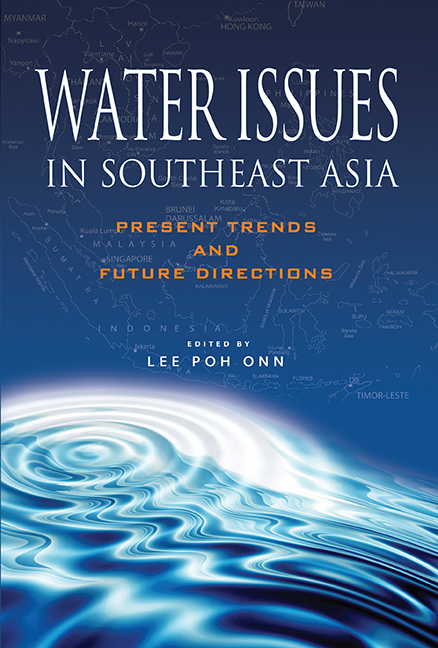Book contents
- Frontmatter
- Contents
- List of Tables, Figures, Boxes and Photos
- Acknowledgements
- About the Contributors
- CHAPTER 1 Introduction
- CHAPTER 2 China and the Potential for Conflict over Water among Eurasian States
- CHAPTER 3 River Basin Agreements as Facilitators of Development
- CHAPTER 4 Privatization of Water Services via Public-Private Partnership and Implications for Southeast Asia
- CHAPTER 5 Indonesia's Water Management Reform
- CHAPTER 6 Water Resource Management Issues in Malaysia
- CHAPTER 7 Privatization Issues in Water Supply in Malaysia
- CHAPTER 8 Troubled Waters: Rehabilitating the Pasig River, the Philippines
- CHAPTER 9 The Privatization of Water Services in Metro Manila: Lessons from a Mixed Outcome
- CHAPTER 10 Singapore's Experience in Water Resource Management
- CHAPTER 11 Thailand's Water Sector: Overview and Implications
- CHAPTER 12 Water Resources and Issues Concerning Sustainable Watershed Management Practices in Vietnam
- Index
CHAPTER 3 - River Basin Agreements as Facilitators of Development
Published online by Cambridge University Press: 21 October 2015
- Frontmatter
- Contents
- List of Tables, Figures, Boxes and Photos
- Acknowledgements
- About the Contributors
- CHAPTER 1 Introduction
- CHAPTER 2 China and the Potential for Conflict over Water among Eurasian States
- CHAPTER 3 River Basin Agreements as Facilitators of Development
- CHAPTER 4 Privatization of Water Services via Public-Private Partnership and Implications for Southeast Asia
- CHAPTER 5 Indonesia's Water Management Reform
- CHAPTER 6 Water Resource Management Issues in Malaysia
- CHAPTER 7 Privatization Issues in Water Supply in Malaysia
- CHAPTER 8 Troubled Waters: Rehabilitating the Pasig River, the Philippines
- CHAPTER 9 The Privatization of Water Services in Metro Manila: Lessons from a Mixed Outcome
- CHAPTER 10 Singapore's Experience in Water Resource Management
- CHAPTER 11 Thailand's Water Sector: Overview and Implications
- CHAPTER 12 Water Resources and Issues Concerning Sustainable Watershed Management Practices in Vietnam
- Index
Summary
BACKGROUND
The earliest activities of man were influenced — in some cases dominated — by access to and use of water: for drinking, cooking, washing, fishing, irrigation, navigation and, later, the generation of power. The progress of civilization can often be mapped in relation to water, most especially in climates where the reliable production of food and fibre depend on the control of water. Gradually, the cumulative impact of many small interventions, accelerated by the much greater impacts of large-scale consumptive development based on storage eventually meant that interventions at one point in a catchment or basin had a measurable impact on availability elsewhere.
This scenario is increasingly evident in many local catchments, as well as river basins at national and international scales. The implications are now well recognized, and are incorporated in statements that management should be at the basin level, that management should be integrated, that competition should be addressed in management, and so on.
In many countries, the symptoms of competition and scarcity are damage to the environment (declining water tables, salinization of aquifers, drying wetlands and estuaries), inequitable water use (head-end farmers using excessive amounts of water, tail-enders getting little or nothing). Such symptoms are widely observed and widely reported.
It is less widely recognized that many countries in the world have developed and controlled their water resources productively and sustainably over many years to the benefit of their populations, providing essential supplies of water for municipal, domestic, industrial, recreational and agricultural use together with protection from the negative impacts of excess water through drainage systems and flood control works. Literally hundreds of millions of people expect and receive some or all of the following services:
• Potable water, directly from a tap, twenty-four hours a day
• Irrigation services, defined in terms of timing, reliability and quality
• Protection from flood events
• Stability of environmental areas
• Water for recreational purposes – fishing, sailing, or swimming
• Assured stream-flows for navigation.
- Type
- Chapter
- Information
- Water Issues in Southeast AsiaPresent Trends and Future Direction, pp. 56 - 75Publisher: ISEAS–Yusof Ishak InstitutePrint publication year: 2012

